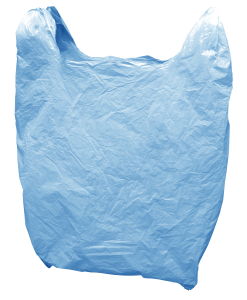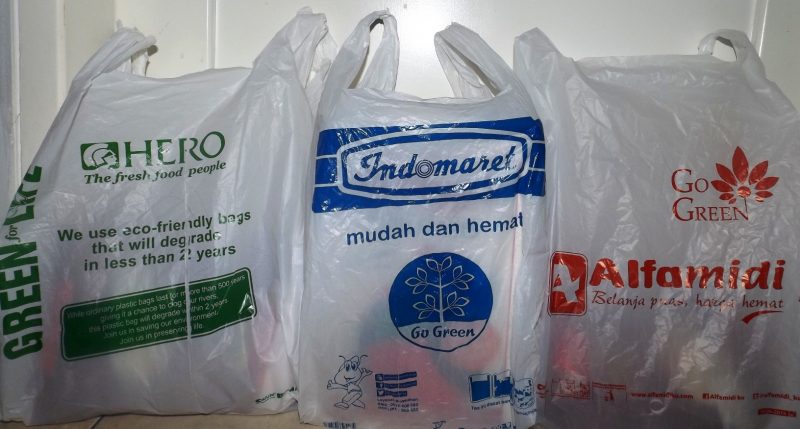Consumers in Indonesia will have noticed that plastic bags from leading chains of convenience stores and supermarkets are now labelled ‘green’ and ‘degradable’. But are these plastic bags really good for the environment?
The short answer is no. Unfortunately, there is no such thing as an environmentally friendly bag. The fact that degradable plastic bags eventually disintegrate does not make them good for the environment. All they do is produce microscopic fragments of plastic, which do not get broken down by biological activity but instead have the potential to end up in the human food chain.
But what about those cool reusable ‘green bags’ used in some countries? And what about fashionable shopping bags made from jute, cotton or hemp? All of these ‘alternative’ bags have an environmental impact. The production of cotton, hemp and jute is resource-intensive, requiring much more energy and resources to produce than common plastic bags. As for the ‘green bags’, so popular in Australia, they are made from non-woven polypropylene, a non-biodegradable byproduct of oil refining. They have to be sent to China for recycling because it is too expensive to unpick their stitching in the West.
If you genuinely care about the planet and want to reduce pollution, you should bring your own reusable bags to the shops. And re-use them hundreds of times over many years until they wear out. If you are too lazy or too embarrassed to bring such bags, then you cannot claim to care for the environment – no matter how many ‘save the orangutan’ or ‘stop illegal logging and forest fires’ campaign images you share on Facebook.
“But I re-use plastic bags as bin liners,” you might argue. That’s great. You should still take reusable bags to the shops. Otherwise you may accumulate hundreds of old plastic bags that eventually start disintegrating and have to be dumped. Many plastic bags end up in waterways, long before they have a chance to fragment, blocking drains and contributing to flooding.
Indonesia is the second-biggest contributor of plastic waste being dumped in the seas, accounting for up to 1.29 million metric tonnes of plastic trash annually, according to the results of a study released this year by the Science journal. Only China dumps more trash into the sea. Larger pieces of plastic can kill marine creatures, while miniscule fragments can enter the food chain.
Sadly, littering seems to be a way of life in Indonesia. Where are the televised public service announcements, showing politicians or celebrities decrying littering? There is one. Politically conscious rock band Slank in 2013 was recruited by the Jakarta administration to join an anti-littering campaign, coinciding with the introduction of a Rp.500,000 fine for littering and fines of up to Rp.25 million for shopping centres that fail to use environmentally friendly bags.
While almost no one gets fined for littering, retailers are providing plastic bags perceived as being good for the environment. There is no international standards system for retail plastic bags. Some countries and states have banned plastic bags. The US state of California in 2008 banned the labelling of plastic bags as ‘biodegradable’, ‘degradable’ or ‘decomposable’ because such terms are misleading to consumers.
Degradable Versus Biodegradable
At this point, we should look at the difference between degradable and biodegradable. Degradable means that something can be biologically or chemically broken down into smaller pieces. So pretty much everything on the planet is degradable. Some plastics contain additives of certain metal compounds to make them break down faster by oxidation. These are called oxo-degradable plastics. Then there are photodegradable plastics, which contain an additive that absorbs light and accelerates their fragmentation.
Biodegradable means that something can be broken down by micro-organisms. Biodegradable plastic decomposes by the action of bacteria, so that its carbon atoms are broken apart and can be used to create other organic molecules. There are two types of biodegradable plastics: those made from renewable raw materials, such as starch (from corn, potatoes, wheat, tapioca and sago); and those made from petrochemicals mixed with biodegradable additives.
In Indonesia, officials and big-name retailers are embracing oxo-degradable plastic bags. Oxygen, ultra-violet light and heat weaken them into smaller pieces over a couple of years. Depending on which organisation’s scientific research you read, these fragments may or may not have a harmful impact. Oxo-degradable plastics are not suitable for recycling with mainstream plastics, such as PET (polyethylene terephthalate) water bottles, as the oxo-degradable additives make any new product more susceptible to degradation.
The market leader in Indonesia for oxo-degradable bags is PT Tirta Marta, which makes Oxium brand bags, which are what you receive at Alfamart, Indomaret, Hero and many other chain stores. Although the bags feature text stating “degradable within two years”, the process may take longer under certain conditions. Oxo-degradable bags cannot be composted because they require sunlight and air to break down, which means they will not disintegrate in buried landfill.
In addition to the ubiquitous Oxium bags, Tirta Marta also makes Ecoplas brand bags, which combine synthetic polymer with tapioca starch. They cost more to produce, hence they are not so widely used. Tirta Marta has received much praise for its efforts to protect the environment, but the Government needs to do much more to combat the nation’s addiction to plastic bags and the national pastime of littering.
In the West, food packaging often has a recyclable symbol on it. In Indonesia, food packaging is more likely to feature the halal certification symbol of the corruption-tainted Indonesian Ulemas Association (MUI). If religious-minded shoppers really wanted to please God, they could start by showing some respect to the planet by not treating it as a giant rubbish dump, rather than caring about whether some corporation has paid for a certificate.
Some people think that because a plastic bag is labelled ‘degradable’, it can be littered without consequence as it will eventually disappear. Try telling that to the next crew of workers pulling plastic muck out of a clogged drain when Jakarta is flooding. Then there are people who believe that littering is a positive activity on the grounds that it provides work for cleaners and scavengers.
Next time you bring home some plastic bags of shopping, look for the Oxium logo and realise that “100% degradation” doesn’t necessarily save the planet from plastic pollution. Instead, try re-using your plastic bags or start using long-life bags. If you really care. And start encouraging others to do the same.




